This article needs additional citations for verification .(April 2018) |
| |||||
| Decades: | |||||
|---|---|---|---|---|---|
| See also: | Other events of 1868 History of China • Timeline • Years | ||||
Events from the year 1868 in China.
This article needs additional citations for verification .(April 2018) |
| |||||
| Decades: | |||||
|---|---|---|---|---|---|
| See also: | Other events of 1868 History of China • Timeline • Years | ||||
Events from the year 1868 in China.

Deng Xiaoping was a Chinese revolutionary leader, military commander and statesman who served as the paramount leader of the People's Republic of China (PRC) from December 1978 to November 1989. After Chinese Communist Party chairman Mao Zedong's death in 1976, Deng gradually rose to supreme power and led China through a series of far-reaching market-economy reforms earning him the reputation as the "Architect of Modern China". He contributed to China becoming the world's second-largest economy by nominal GDP in 2010.

Mao Zedong, also known as Chairman Mao, was a Chinese politician, political theorist, military strategist, poet, and communist revolutionary who was the founder of the People's Republic of China (PRC), which he led as the chairman of the Chinese Communist Party from the establishment of the PRC in 1949 until his death in 1976. Ideologically a Marxist–Leninist, his theories, military strategies, and political policies are collectively known as Maoism.

The Cultural Revolution, formally known as the Great Proletarian Cultural Revolution, was a sociopolitical movement in the People's Republic of China (PRC) launched by Mao Zedong in 1966, and lasting until his death in 1976. Its stated goal was to preserve Chinese communism by purging remnants of capitalist and traditional elements from Chinese society. The Revolution marked the effective commanding return of Mao—who was still the chairman of the Chinese Communist Party (CCP)—to the centre of power, after a period of self-abstention and ceding to less radical leadership in the aftermath of the Mao-led Great Leap Forward debacle and the Great Chinese Famine (1959–1961). The Revolution failed to achieve its main goals.

Maoism, officially called Mao Zedong Thought by the Chinese Communist Party (CCP), is a variety of Marxism–Leninism that Mao Zedong developed to realize a socialist revolution in the agricultural, pre-industrial society of the Republic of China and later the People's Republic of China. The philosophical difference between Maoism and traditional Marxism–Leninism is that a united front of progressive forces in class society would lead the revolutionary vanguard in pre-industrial societies rather than communist revolutionaries alone. This updating and adaptation of Marxism–Leninism to Chinese conditions in which revolutionary praxis is primary and ideological orthodoxy is secondary represents urban Marxism–Leninism adapted to pre-industrial China. Later theoreticians expanded on the idea that Mao had adapted Marxism–Leninism to Chinese conditions, arguing that he had in fact updated it fundamentally and that Maoism could be applied universally throughout the world. This ideology is often referred to as Marxism–Leninism–Maoism to distinguish it from the original ideas of Mao.

The Chinese Civil War was fought between the Kuomintang-led government of the Republic of China and forces of the Chinese Communist Party, with armed conflict continuing intermittently from 1 August 1927 until 7 December 1949, and ending with Communist control of mainland China.

The time period in China from the founding of the People's Republic in 1949 until Mao's death in 1976 is commonly known as Maoist China and Red China. The history of the People's Republic of China is often divided distinctly by historians into the Mao era and the post-Mao era. The country's Mao era lasted from the founding of the People's republic on 1 October 1949 to Deng Xiaoping's consolidation of power and policy reversal at the Third Plenum of the 11th Party Congress on 22 December 1978. The Mao era focuses on Mao Zedong's social movements from the early 1950s on, including land reform, the Great Leap Forward and the Cultural Revolution. The Great Chinese Famine, one of the worst famines in human history, occurred during this era.
Quotations from Chairman Mao Tse-tung is a book of statements from speeches and writings by Mao Zedong, the former Chairman of the Chinese Communist Party, published from 1964 to about 1976 and widely distributed during the Cultural Revolution.

Zhu De was a Chinese general, military strategist, politician and revolutionary in the Chinese Communist Party. Born into poverty in 1886 in Sichuan, he was adopted by a wealthy uncle at age nine. His uncle provided him with a superior early education that led to his admission into a military academy. After graduating, he joined a rebel army and became a warlord. It was after this period that he adopted communism. Joining the Chinese Communist Party, he ascended through the ranks of the Chinese Red Army as it closed in on securing the nation in the Chinese Civil War. By the time China was under Mao's control, Zhu was a high-ranking official within the party. He served as commander-in-chief of the Eighth Route Army during the Second Sino-Japanese War and commander-in-chief of the Eighth Route Army during the Chinese Communist Revolution, and the People's Liberation Army after liberation. In 1955, he ranked first among the ten founding marshals of the People's Republic of China, of which he is regarded as one of the principal founders. Zhu remained a prominent political figure until his death in 1976. As the chairman of the Standing Committee of the National People's Congress from 1975 to 1976, Zhu was the head of state of the People's Republic of China.

The Tongzhi Emperor, temple name Emperor Muzong of Qing, born Aisin-Gioro Zaichun, was the ninth Emperor of the Qing dynasty, and the eighth Qing emperor to rule over China proper. His reign, from 1861 to 1875, which effectively lasted through his adolescence, was largely overshadowed by the rule of his mother, Empress Dowager Cixi. Although he had little influence over state affairs, the events of his reign gave rise to what historians call the "Tongzhi Restoration", an unsuccessful modernization program.
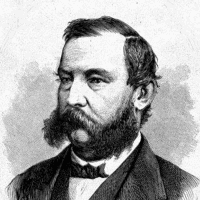
Anson Burlingame was an American lawyer, Republican/American Party legislator, diplomat, and abolitionist. As diplomat, he served as the U.S. minister to China (1862–1867) and then as China's envoy to the U.S., which resulted in the 1868 landmark Burlingame Treaty.
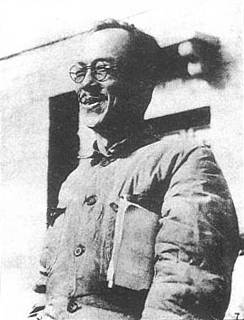
Kang Sheng was a Chinese Communist Party (CCP) official, best known for having overseen the work of the CCP's internal security and intelligence apparatus during the early 1940s and again at the height of the Cultural Revolution in the late 1960s and early 1970s. A member of the CCP from the early 1920s, he spent time in Moscow during the early 1930s, where he learned the methods of the Soviet NKVD and became a supporter of Wang Ming for leadership of the CCP. After returning to China in the late 1930s, Kang Sheng switched his allegiance to Mao Zedong and became a close associate of Mao during the Anti-Japanese War, the Chinese Civil War and after. He remained at or near the pinnacle of power in the People's Republic of China from its establishment in 1949 until his death in 1975. After the death of Chairman Mao and the subsequent arrest of the Gang of Four, Kang Sheng was accused of sharing responsibility with the Gang for the excesses of the Cultural Revolution and in 1980 he was expelled posthumously from the CCP.

Chen Boda, was a Chinese Communist journalist, professor and political theorist who rose to power as the chief interpreter of Maoism in the first 20 years of the People's Republic of China. Chen became a close associate of Mao Zedong in Yan'an, during the late 1930s, drafting speeches and theoretical essays and directing propaganda.
Dong Biwu was a Chinese communist revolutionary and politician, who served as acting Chairman of the People's Republic of China between 1972 and 1975.
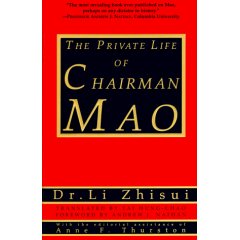
The Private Life of Chairman Mao: The Memoirs of Mao's Personal Physician is a memoir by Li Zhisui, one of the physicians to Mao Zedong, former Chairman of the Chinese Communist Party, which was first published in 1994. Li had emigrated to the United States in the years after Mao's death. The book describes the time during which Li was Mao's physician, beginning with his return to China after training in Australia, through the height of Mao's power to his death in 1976 including the diverse details of Mao's personality, sexual proclivities, party politics and personal habits.
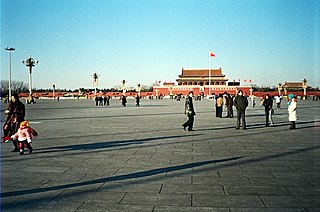
Tiananmen Square or Tian'anmen Square is a city square in the city center of Beijing, China, named after the eponymous Tiananmen located to its north, which separates it from the Forbidden City. The square contains the Monument to the People's Heroes, the Great Hall of the People, the National Museum of China, and the Mausoleum of Mao Zedong. Mao Zedong proclaimed the founding of the People's Republic of China in the square on October 1, 1949; the anniversary of this event is still observed there. The size of Tiananmen Square is 765 x 282 meters. It has great cultural significance as it was the site of several important events in Chinese history.
Feudal fascism, also revolutionary-feudal totalitarianism, were official terms used by the post-Mao Zedong Chinese Communist Party to designate the ideology and rule of Lin Biao and the Gang of Four during the Cultural Revolution. In 1979, the Chairman of the Standing Committee of the National People's Congress, Ye Jianying, described Mao Zedong's reign as a “feudal-fascist dictatorship” due to his revolutionary terror-based cult of personality, nationalism and authoritarianism despite superficially socialist policies.

Lin Boqu was a Chinese politician and poet. An early supporter of Sun Yat-sen and member of the Tongmenghui, as well as a later participant in the Nanchang Uprising and the Long March, Lin came to be seen as one of the elder statesmen of the Chinese Communist Party.

The Chinese Communist Revolution was a social and political revolution that culminated in the establishment of the People's Republic of China in 1949. For the preceding century, China had faced escalating social, economic, and political problems as a result of Western imperialism, Japanese imperialism, and the decline of the Qing dynasty. Cyclical famines and an oppressive landlord system kept the large mass of rural peasantry poor and politically disenfranchised. The Chinese Communist Party (CCP) was formed in 1921 by young urban intellectuals inspired by European socialist ideas and the success of the Bolshevik Revolution in Russia. The CCP originally allied itself with the nationalist Kuomintang party against the warlords and foreign imperialist forces, but the Shanghai Massacre of Communists ordered by KMT leader Chiang Kai-shek in 1927 forced them into the Chinese Civil War spanning more than two decades.
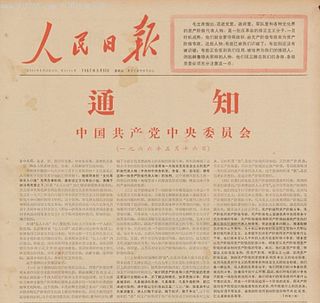
The May 16 Notification or Circular of May 16, officially Notification, was the first major political declaration of the Chinese Cultural Revolution. It was issued at a May 1966 expanded session of the Politburo of the Chinese Communist Party. The May 16 Notification ended a political dispute within the CCP stemming from the Beijing Opera play Hai Rui Dismissed from Office by dissolving the top level of the party's cultural apparatus and encouraging mass political movement to oppose rightists within the party. The result was a political victory for Mao Zedong. The Notification is often viewed as the beginning of the Cultural Revolution.
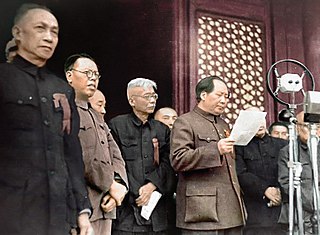
The founding of the People's Republic of China was formally proclaimed by Mao Zedong, the Chairman of the Chinese Communist Party (CCP), on October 1, 1949, at 3:00 pm in Tiananmen Square in Beiping, the new capital of China. The formation of the Central People's Government under the leadership of the CCP, the government of the new state, was officially proclaimed during the proclamation speech by the chairman at the founding ceremony.
1 page matching "Lin Sen (1868-1943), zi Zichao, was a native of Fujian. In 1912-1913, he was chairman of the Senate in Beijing" in this book